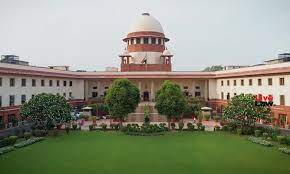The first respondent, thus, prayed for a direction to the appellant the Container Corporation of India Ltd. (for short, ‘the Container Corporation’) and the Railway Board to shift the operations of the said ICD at Tughlakabad which are not bound for Delhi to other locations outside Delhi. The second direction was to prohibit entry of containers/trailers at the said ICD, Tughlakabad, which are not bound for Delhi and only to utilise CNG run/battery operated Fork Lifts/empty Handlers and small vehicles, as also run electric trains rather than diesel locomotives in and out of the said ICD. (Para 1)
The NGT passed an order directing the appellant to ensure that, in a phased manner, diesel vehicles stop visiting the ICD and shift to electric, hybrid and CNG vehicles. The Tribunal observed that the other alternative was to limit the entry of diesel vehicles only to the satellite terminals (ICDs) at Dadri, Rewari, Ballabhgarh, Khatuawas or any other ICD around Delhi. The Tribunal observed that this will ensure that diesel vehicles do not enter Delhi NCR. An outer limit of six months was fixed under the impugned order by the NGT to comply with the directions above. An action plan was ordered to be filed within one month. (Para 3)
On 22nd April 2019, this Court issued notice on the present appeal and directed that no coercive action shall be taken against the appellant based on the impugned order. On 10th February 2020, when this Court noticed that no solution was forthcoming, a direction was issued to the Environment Pollution (Prevention and Control) Authority (‘EPCA’) to look into the issues raised in the appeal and to file a report containing its recommendations. We may note here that EPCA has been set up under the orders of this Court to protect and improve the quality of the environment in Delhi NCR. (Para 4)
Before we deal with the recommendations and the stand taken by the parties, it is necessary to understand the significance of an ICD or a dry port in the transportation and logistics chain. (Para 10)
Now, coming to the recommendations of the EPCA, while accepting the need to shift vehicles to cleaner fuels like CNG/Hybrid/Electric, the EPCA observed that there are limitations in the technology. It is noted that no alternative fuel technology is available for the category of heavy duty vehicles used for transporting containers. (Para 11)
Hence, we dispose of the appeal by passing the following directions in substitution of the directions in the impugned order:
a. After examining recommendation 3.1, the Union of India shall formulate a policy of phasing out heavy duty diesel vehicles and replacing them with BSVI vehicles. The Union of India shall formulate appropriate policy on this behalf within six months from today;
b. Though the Union of India is a party through the Ministry of Environment, Forest and Climate Change, the Ministry of Road Transport and Highways is not formally made a party. We, therefore, direct the Registry to forward a copy of this order to the Secretary of the Ministry of Road Transport and Highways.
c. The process of exploring the possibility of finding better sources, including CNG/Hybrid/Electric, for the use of heavy duty vehicles shall continue;
d. The plan for optimal utilisation of ICDs around Delhi, in terms of recommendation no. 3.2 shall be formulated by the appellant within six months from today. In the meanwhile, the appellant will coordinate with all the official agencies to enable the setting up of central laboratories near ICDs around Delhi NCR;
e. We direct the appellant to implement the recommendations made by KPMG in February 2021 for improving the parking management of vehicles in the said ICD. We grant time of six months to the appellant to implement the recommendations of the KPMG; (Para 22)
SUPREME COURT OF INDIA
2024 STPL(Web) 32 SC
[32024 INSC 31]
Container Corporation Of India Ltd Vs. Ajay Khera & Ors
Civil Appeal No. 3798 OF 2019-Decided on 11-01-2024.
https://stpllaw.in/wp-content/uploads/2024/01/2024-STPLWeb-32-SC.pdf







